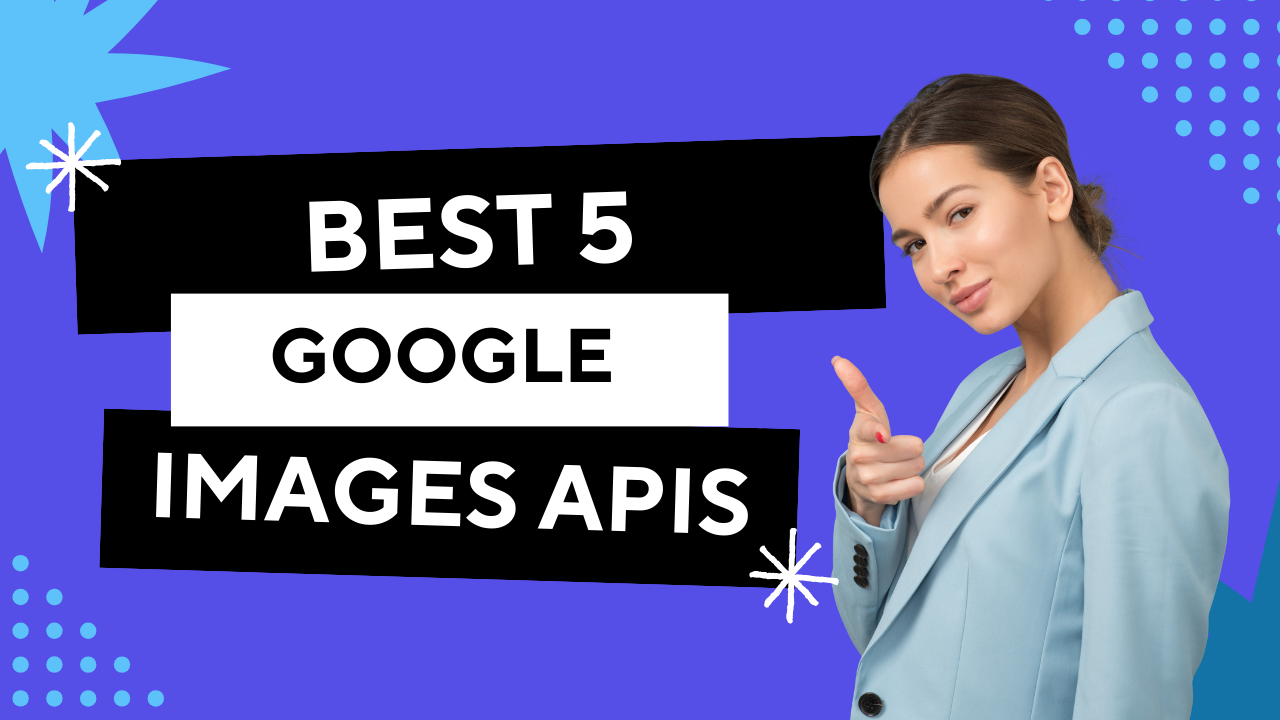In an age where visual content dominates digital communication, accessing and analyzing images has never been more critical. The ability to swiftly sift through vast repositories of images to find the exact visual data needed can be a game-changer for businesses, developers, and researchers.
This is where Google Images APIs come into play, offering powerful tools to unlock visual intelligence from the web’s extensive image databases. From enhancing search functionalities to implementing sophisticated image recognition technologies, these APIs provide the necessary capabilities to harness the full potential of visual data, thereby transforming how we interact with images online.
For those looking to delve into visual intelligence, this guide will navigate through the top 10 Google Images APIs, each offering unique features to cater to various needs and applications.
Serpdog
Serpdog’s Google Images API emerges as the most efficient tool for accessing the vast repository of Google Images. What sets Serpdog apart is its ability to deliver precise image data in a structured format allowing for the automation of image data depending on specific criteria including size, color, and even non-licensed images.
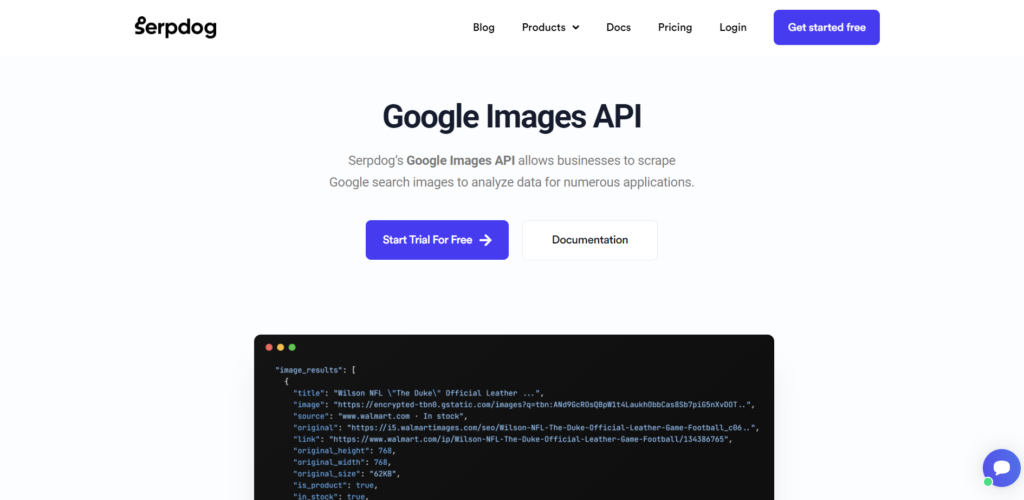
Also, Serpdog consists of a vast infrastructure encompassing all the major Google APIs including Search, News, Shopping, and Videos, showing their immense experience in scraping Google Search Engine results.
Features:
- Dedicated documentation is available and can even be understood by beginners. They offer integrations for all major languages, including JavaScript, Python, and Java.
- The average response time of their API is 1–2 seconds.
- API is super economical and offers several subscriptions depending on the volume of businesses.
- Customer support is fast and active, rated 4.8 on Trustpilot.
- Moreover, they offer users a 30-day free trial, renewed every month.
- Subscriptions start at 30$, and they offer 32k API calls in the starter plan.
API Testing
For testing, we ran a loop of 100 requests and exited the loop after 4 minutes and 37 seconds. This means the average speed for this API is 2.7 seconds per request.
BrightData
BrightData is currently the biggest player in the data scraping industry and provides a wide range of datasets for popular websites, including Google Images. They are currently sitting on a huge residential proxy pool of 72M+ IPs, which can be used for targeting any location on the planet.
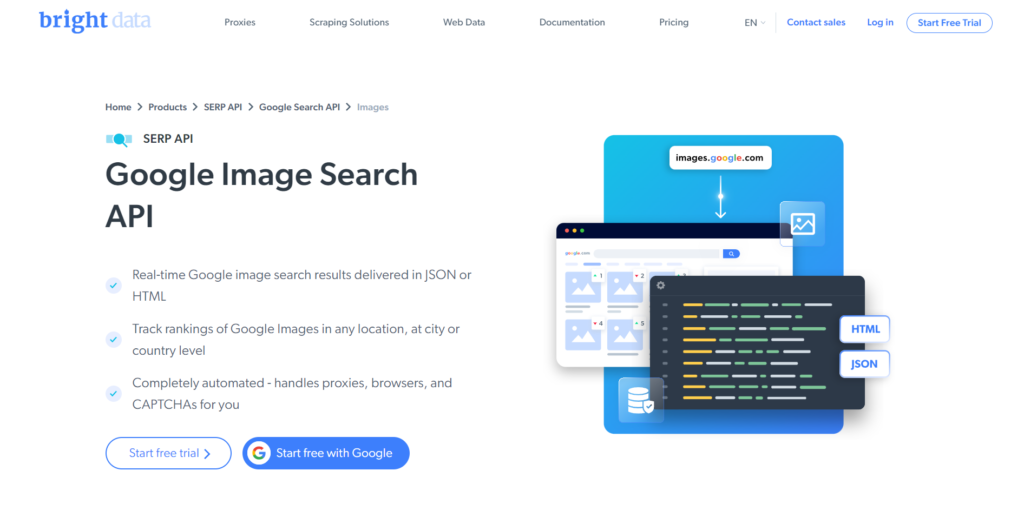
They include all the necessary features for smooth scraping services, such as JS rendering, IP rotation, and more. They have built advanced capabilities into their dashboard and offer strong, active support to guide you through the setup and execution of your data collection strategies.
Here are some features offered by BrightData to its customers:
- Documentation is clear and detailed, and they have active support to guide you through every problem.
- Their API can be used for product matching, anti-counterfeiting, rank tracking, and other use cases.
- API is constantly monitored and updated to provide the best quality services to their customers.
- The average response time of their API is under 2–3 seconds.
- Pricing is highly competitive and starts from 10$, which gives you approximately 5,500 credits.
Bright Data can be considered an expert in data scraping, having been in the market for a long time with a great team of data professionals who constantly work to improve the product and provide new features for businesses looking to access data at scale.
ScraperAPI
ScraperAPI is one of the most trusted web scraping solutions currently in the market, with expertise in providing Google Images data to its users. They have a powerful dedicated backend mechanism designed to handle any kind of blockage, enabling you to retrieve data with just a simple API call.
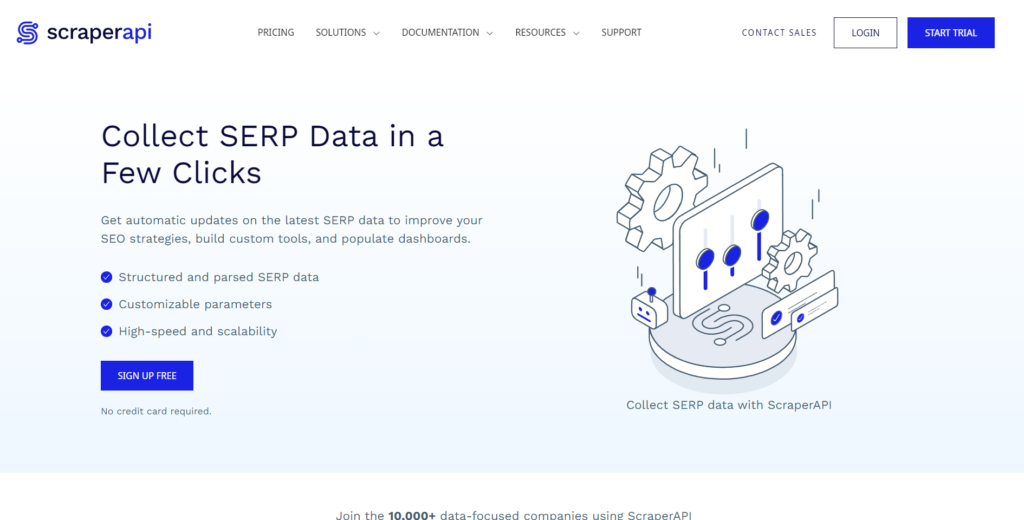
Here are some of the features to consider when choosing ScraperAPI as your data provider:
- Proxy Coverage — They have a vast network of 40M+ residential and data center IPs across 50+ countries.
- API Speed — The average response time of their API is 3–4 seconds, which is a long delay for businesses looking to integrate their applications based on real-time data.
- Dedicated Documentation — Documentation is well explained and is available in every major language.
- Request Customization — Their API supports request customization, including custom headers, geolocation, and IPs.
- Highly Scalable — If you have an enterprise-level demand, there is no need to worry as they can handle millions of requests on their servers without any problem.
- Pricing — The basic plan starts from 49$, which offers 4k Google Credits to the users and goes to 299$.
ScraperAPI also offers users a free plan of 1000 credits to thoroughly test the API before upgrading to the paid plan.
API Testing
For testing, we ran a loop of 100 requests and exited the loop after 6 minutes and 56 seconds. This means the average speed for this API is 4.16 seconds per request.
SerpAPI
When it comes to extracting Google Images data rapidly and efficiently, SerpAPI emerges as one of the major players in search engine results scraping. It is an old and trusted brand in the market and allows its users to get access to every inch of information that can be found on the search engine page.
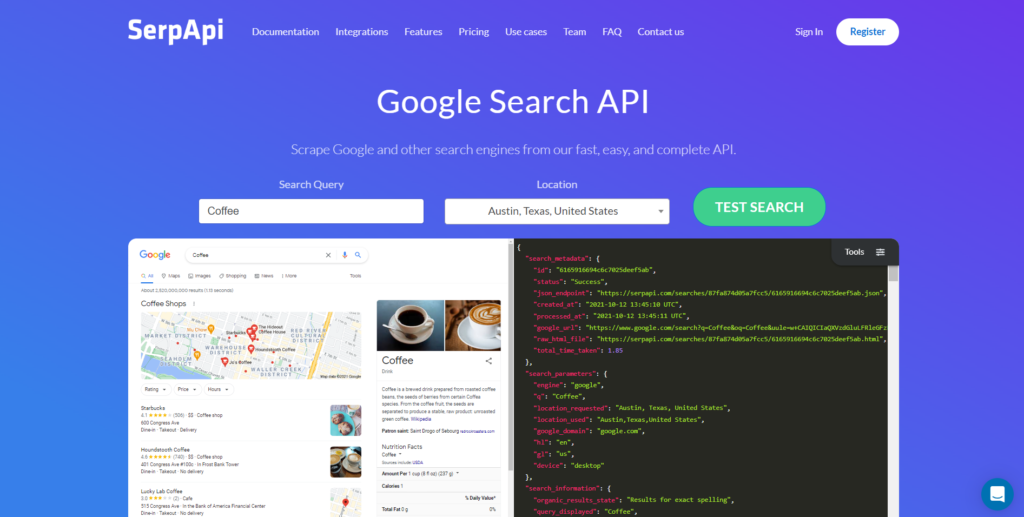
The SerpAPI infrastructure is designed to handle large volumes of requests without compromising speed and reliability. Their server is scalable and adaptable to user demands, capable of targeting any location worldwide and delivering consistent results as if the user were using the search engine from that location.
Their support is always active no matter when you ask, and they are consistently improving the API to help you retrieve data points from every part of the page. However, it’s worth noting that SerpAPI currently offers the most expensive Google Images API in the industry.
Their pricing starts at $75 for 5,000 searches, which may be considered expensive for small companies. However, the company is trusted by global brands such as Apple, OpenAI, and Nvidia, demonstrating its effectiveness in delivering quality search engine data.
API Testing
For testing, we ran a loop of 100 requests and exited the loop after 9 minutes and 15 seconds. This means the average speed for this API is 5.5 seconds per request.
Oxylabs
Oxylabs is another major player in the industry, specializing in providing a wide range of API services to its customers. With a proxy pool of over 102 million proxies, it is highly scalable for scraping Google Images, offering 5,000 URLs in a single batch.

It does have some pros and cons, however these features can be considered when selecting Oxyalbs as your image data provider:
- API Speed —Oxylabs’ Google Images API is not as fast, typically taking around 5 to 6 seconds to return results.
- Dedicated Documentation — Their API can be integrated with every major language. Thanks to its detailed documentation.
- Request Customization — Their API supports several parameters and custom parsing instructions making it highly user-friendly for its customers.
- Pricing — The basic plan starts from 49$, which offers 17k Google Credits to the users and goes to 299$.
API Testing
For testing, we ran a loop of 100 requests and exited the loop after 6 minutes and 18 seconds. This means the average speed for this API is 3.78 seconds per request.
Test Results
BrightData is excluded from the test results as were not able to test. These test results in the future will be going to more descriptive and diverse. As of now, here is the current situation.
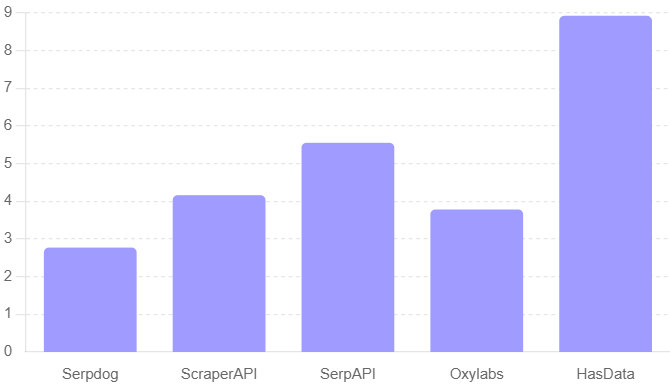
Conclusion
Every API has its unique features and functionalities. To determine the best image API for your needs, test it thoroughly and check all the parameters including speed, reliability, and scalability before going with the subscription.
Additional Resources
I have prepared a complete list of blogs on Google scraping, which can help you in your data extraction journey:

